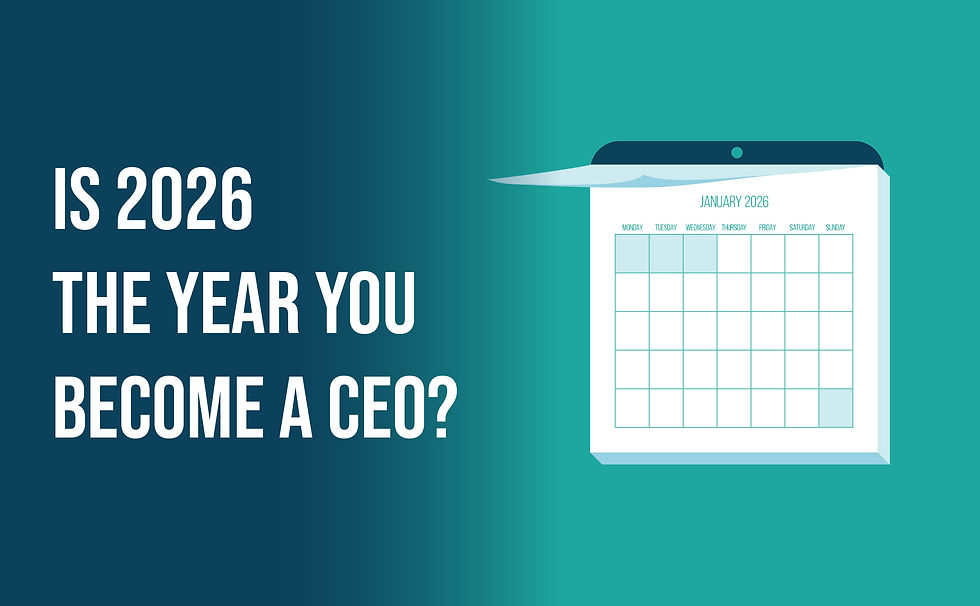IN AN EXECUTIVE INTERVIEW, IT'S ALL ABOUT THE NUMBERS
- Aug 17, 2023
- 3 min read
Updated: Sep 19, 2024

Picture this. You’re an executive search consultant interviewing two prospective candidates for an executive role.
You ask each the usual questions, including how they made an impact in their previous roles.
Candidate A looks blank, then begins to waffle about their prior experience.
Candidate B, on the other hand, draws on specific numbers to illustrate their impact. They know their top line revenue numbers, their margins and who their biggest customers are. Confident. Precise. Polished.
Who do you hire?
It’s a bit of a no brainer. As a senior executive, you really need to understand the numbers you have responsibility over, inside and out, particularly when you’re in the interview hot seat.
But you need to know them sooner than that in all honesty. The numbers should be in your resume and front of mind when you first walk into an executive interview.
So, what numbers do you need to know?
As a senior executive, at a bare minimum you should know about your company’s revenue and profit margins.
You may want to be across cost of goods/services sold and delivery in full on time (DIFOT). These are the kinds of figures you can draw on in an interview setting to showcase your impact.
Depending on your role, there may also be department-specific numbers that can build your case for being appointed. For example, if you work in sales, you need to know your margins and your most successful distributors. If you are the head of marketing, what’s your marketing spend and conversion rate? As an HR head, what do your employee engagement or satisfaction scores look like.
Why executives need to know the numbers
Business is all about numbers. The numbers you share in an interview tell the story of your previous performance.
Using quantitative data, helps build your credibility and trust showing that you’re the right person for the executive role.
“For fast-moving consumer goods (FMCG) executives that grow up in companies like Unilever and Mondelez, it gets drilled into them as a graduate that they need to understand their numbers,” says Executive Interview Coaching founder Richard Elstone.
“But it doesn’t matter if you’re an executive in a finance or mining company, a utility or an FMCG company, you need to know your numbers in an interview situation.
“The person that’s hiring you needs to know that you’re going to be the least of their problems. They want to know how you have you turned a customer around. Have you turned a supplier around? Have you improved sales? How you increased margins? What are the war stories behind the numbers you are talking about in the interview?”
The truth about numbers
If at this point, you are panicking and thinking you don’t have a clue about the numbers, don’t worry, you’re not alone.
Richard says many executives don’t know these numbers, or even how to access this information about their company.
“It constantly amazes me how many executives I interview and meet that don’t know their numbers,” he says.
“You need to know the historic numbers and what they are today. It’s fundamental.”
So, if you’re scratching your head wondering where to find these magical numbers, a good place to start is your company’s annual reports. These provide a wealth of financial information on your company’s performance, assets, liabilities and more.
You may even have to go direct to your team for a breakdown of the figures.
“A tip is to say you’re putting together a strategic plan for next year’s growth ask your finance department to put together a breakdown by product, customer, distributor and retailer, and what the margins are for each,” says Richard.
“Otherwise you won’t be prepared for the interview and you’ll be shot down in flames.”
The bottom line
When it comes to landing your next executive role, you need to illustrate the difference you made in your previous or current roles by explaining your measurable impact. How? With numbers. Start by including the numbers in your resume. Start by including the numbers in your resume. You can find tips for getting your resume up to scratch here.
Next, you need to prepare for the executive interview and learn the art of storytelling and how to prepare war stories in an interview, while at the same time drawing on… you guessed it… the numbers!
Executive Interview Coaching provides tailored advice to help you land your next executive role. Get in touch today to find out about our Interview Ready program.



